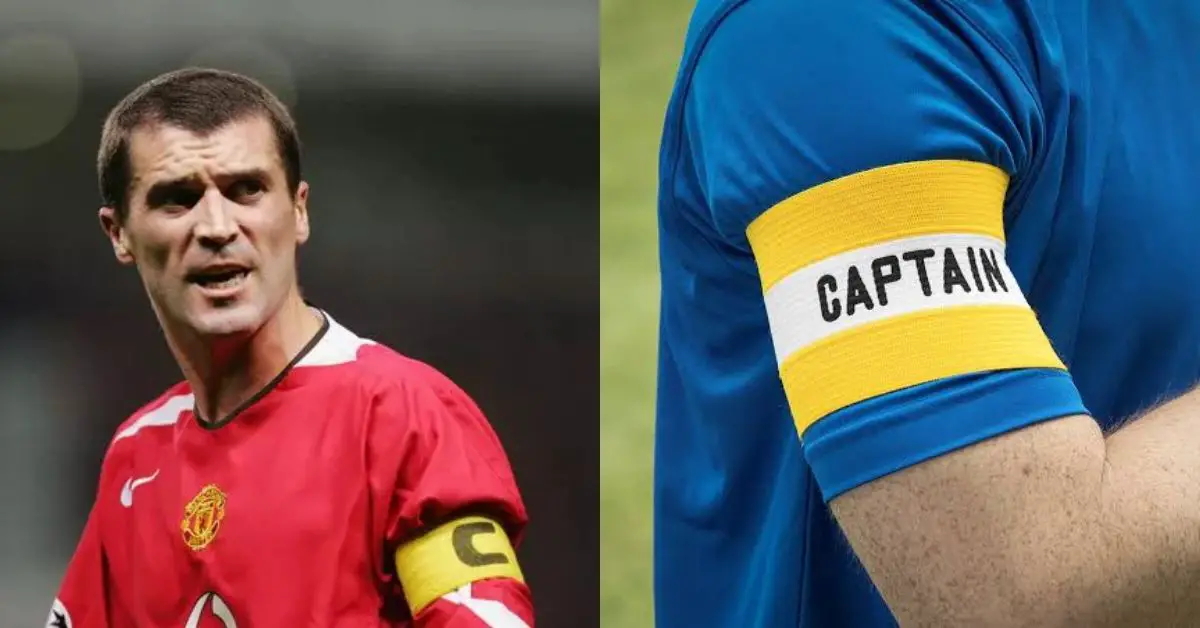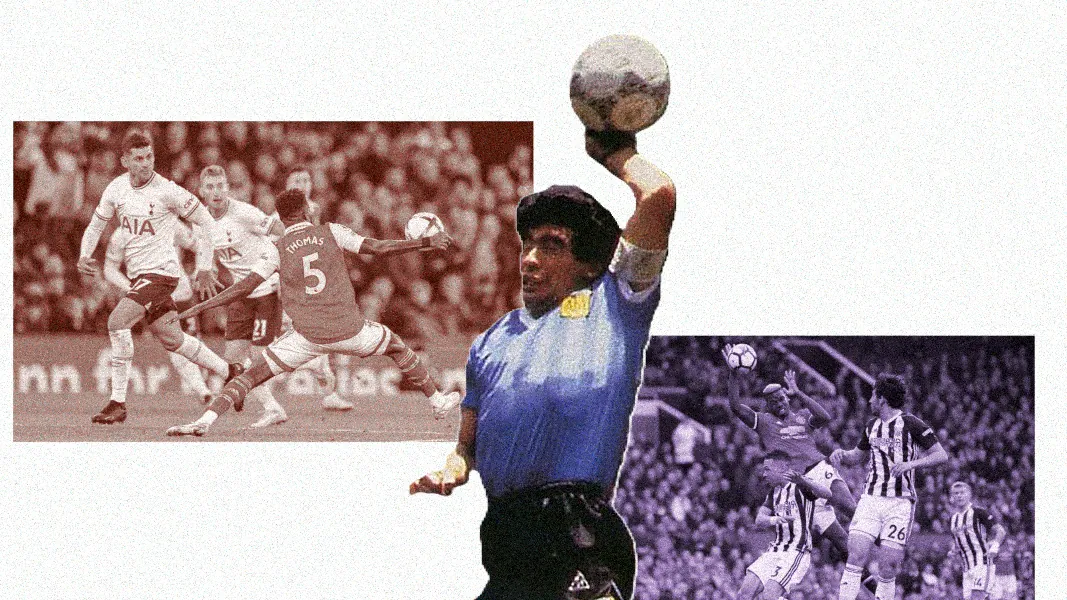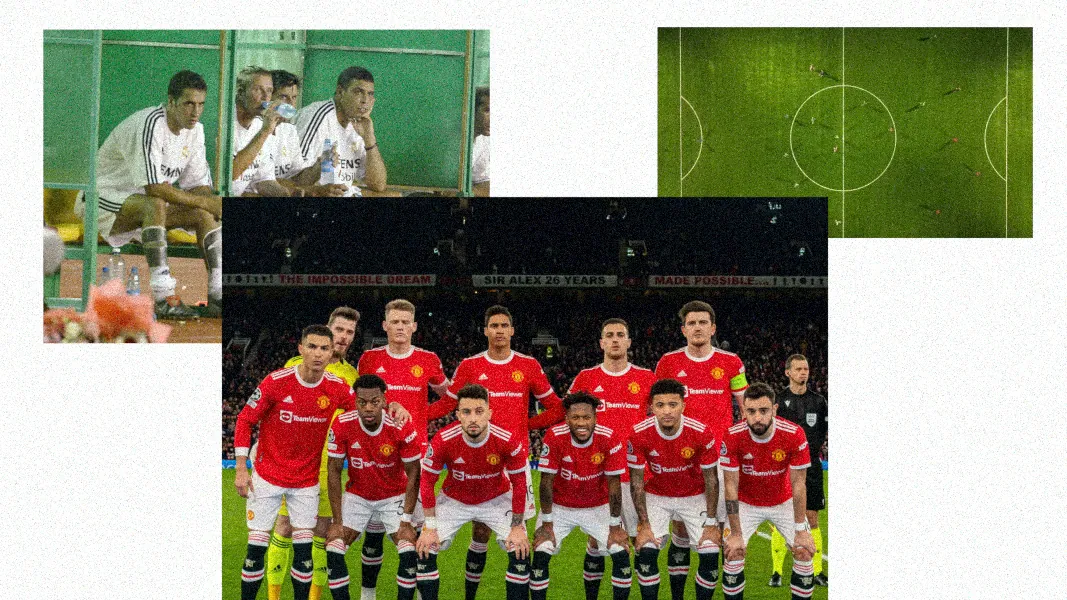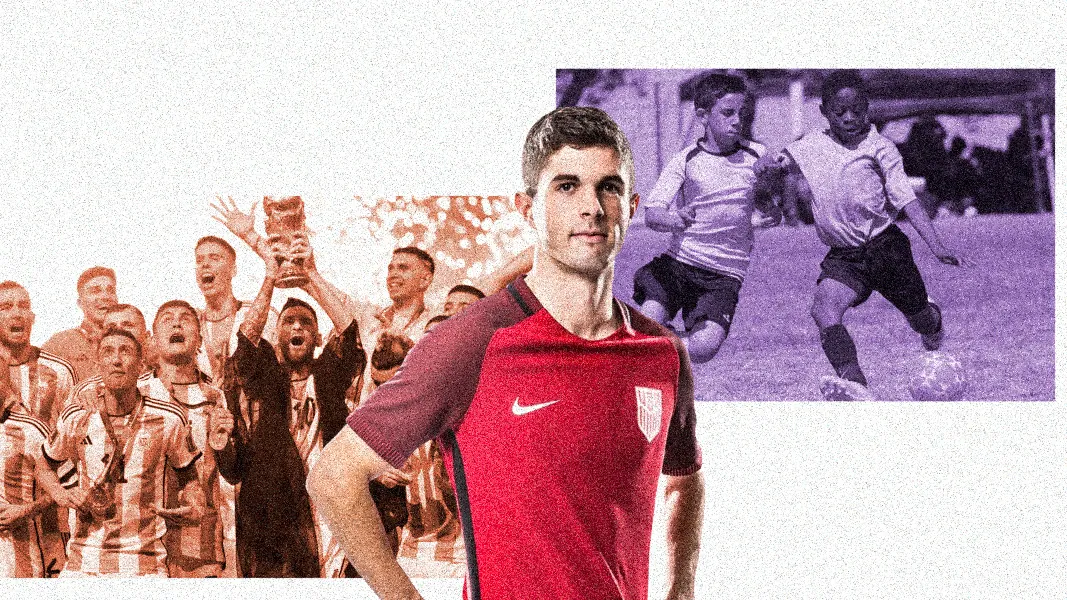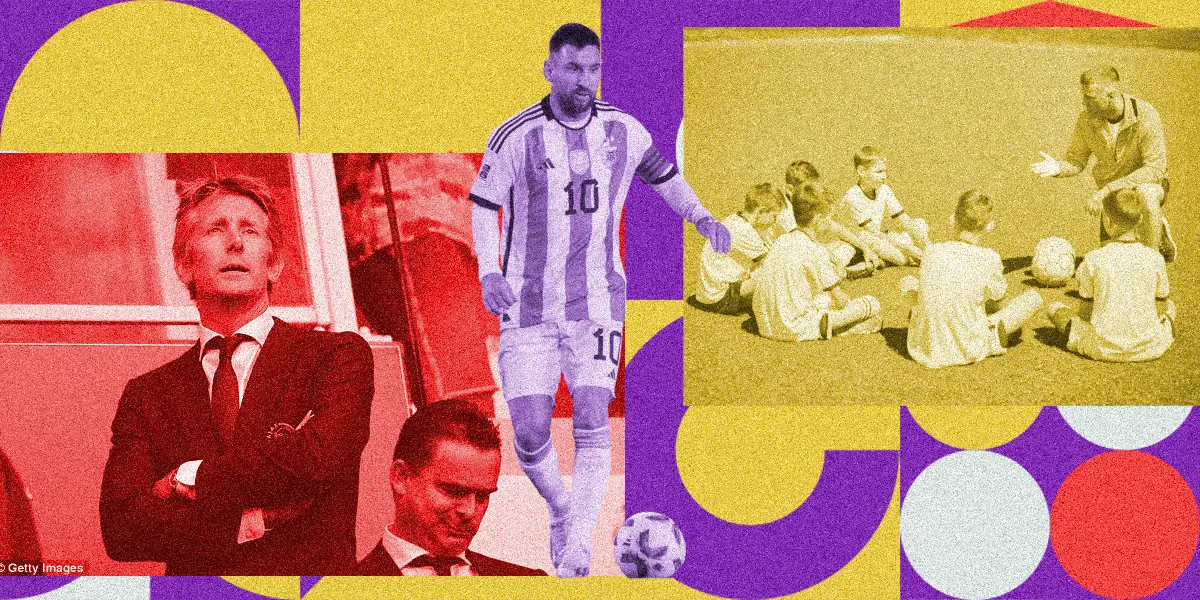In soccer, the captain is the team’s leader on and off the field. They make critical decisions, communicate with teammates, and represent the team to officials. The captain motivates, organizes, and leads by example to ensure the team’s success.
In this article, we delve into the multifaceted responsibilities of a soccer captain. We’ll uncover the captain’s vital role in pre-match preparations, on-field decision-making, and off-field diplomacy.
Key Takeaways:
- Soccer captains are leaders on and off the field.
- They represent the coach, communicate with officials, and mediate disputes among teammates.
- Captains set the tone for matches, ensure proper preparation, and inspire their team.
- Leadership qualities, not necessarily skill, are what make a great captain.
- The captain’s armband is a symbol of tradition and a legacy of leadership in soccer.
Origins of the Captaincy Role in Soccer
Embed from Getty ImagesThe origins of the captaincy role in soccer can be traced back to the sport’s early days in the 19th century. At that time, soccer was an evolving sport with loosely defined rules. Captains emerged as essential figures to maintain order and make decisions during matches.
Initially, the role of the captain was relatively informal. One of the team’s more experienced or respected players would take on the responsibility of guiding their teammates. This often involved making on-field decisions, such as settling disputes, choosing sides, or deciding which team would kick off.
As soccer evolved and became more organized, the captain’s role gained significance. With the establishment of formal rules and regulations, the captain became the designated spokesperson for the team. They would engage in pre-match discussions with the opposing captain and the match officials, helping to ensure that the game proceeded smoothly.
Over time, the captaincy role developed into a symbol of leadership and authority within the team. Captains were expected to lead by example, demonstrating not only their skills on the field but also their ability to motivate and inspire their teammates. This tradition of on-field leadership and representation continues to be a fundamental aspect of soccer today.
Traits of a Good Soccer Captain
Embed from Getty Images- Leadership: A good captain leads by example and motivates their teammates both on and off the field.
- Communication: They are effective communicators, ensuring that instructions and strategies are clearly conveyed to the team.
- Decision-Making: Captains make quick and informed decisions during matches, such as choosing sides or handling disputes.
- Confidence: They display confidence in their abilities, which can inspire team members to perform at their best.
- Team Player: Despite their leadership role, captains prioritize the team’s success over personal glory.
- Respect: Good captains show respect for teammates, coaches, opponents, and officials, setting a positive example.
- Work Ethic: They work hard both in training and during matches, demonstrating dedication and commitment.
- Positivity: Captains maintain a positive attitude, even in challenging situations, to keep team morale high.
- Adaptability: They can adapt to changing game situations and adjust strategies accordingly.
- Responsibility: Captains take responsibility for their actions and the team’s performance, win or lose.
- Understanding: They understand the strengths and weaknesses of their teammates and help utilize them effectively.
- Conflict Resolution: Captains mediate conflicts within the team and foster a harmonious environment.
- Fitness: They maintain peak physical condition to set an example for the team.
- Mentorship: Captains often mentor younger or less experienced players, helping them develop their skills and confidence.
- Consistency: They consistently perform at a high level, providing a stable presence on the field.
- Integrity: Captains play with integrity, adhering to the rules and promoting fair play.
- Inspiration: They inspire teammates through their actions, words, and determination.
- Focus: Captains remain focused on the game, avoiding distractions and staying engaged.
- Accountability: They hold themselves and their teammates accountable for their actions and performance.
- Goal-Oriented: Captains work with the team to set and achieve goals, whether they are short-term or long-term objectives.
Responsibilities of a Soccer Captain During Matches
Tossing the Coin: The Captain’s First Decision
Embed from Getty ImagesThe captain’s first responsibility begins before the match even starts. They represent their team by participating in the coin toss with the opposing captain and the match officials. This seemingly simple act carries significance as it determines which team will kick off and which goal they will defend. The captain’s decision at this moment can set the tone for the game.
On-field Communication and Organization
Embed from Getty ImagesDuring the match, the captain assumes a pivotal role in on-field communication and organization. They act as a bridge between the coach’s instructions and the players on the field. This involves relaying tactical information, making quick decisions, and ensuring that the team operates smoothly.
The captain’s vocal presence can be heard across the field, guiding teammates, directing their movements, and making them aware of changing game situations. They organize defensive and offensive strategies, ensuring that players are positioned optimally.
Role in Set Pieces and Free Kicks
Embed from Getty ImagesIn soccer, set pieces and free kicks provide valuable opportunities to score goals. The captain often plays a critical role in these situations. They may be responsible for deciding the strategy, such as which players will be involved, where the ball should be placed, and the type of play to execute.
During set pieces and free kicks, the captain’s leadership shines as they coordinate their teammates, ensuring everyone understands their role and positioning. This includes marking opponents, making decoy runs, or positioning players strategically to receive the ball. Captains often take free kicks themselves or designate a skilled player for the task.
How the Captain Represents the Coach on the Field
Embed from Getty ImagesThe captain in soccer serves as a direct link between the coach and the team during matches. On the field, they embody the coach’s strategies, philosophy, and vision. This representation extends beyond mere symbolism; it’s a responsibility that carries significance.
When the captain steps onto the field, they reflect the coach’s game plan in their actions and decisions. Their style of play, adherence to tactical instructions, and leadership reflect the coach’s influence.
Tactical Discussions and Strategy Implementation
Tactical discussions between the captain and the coach are a vital aspect of their relationship. Before and during matches, they engage in discussions regarding the game plan. These conversations involve in-depth analysis of the opponent, strategies for offense and defense, and potential adjustments based on real-time observations.
The captain takes these tactical insights and implements them on the field. They are responsible for ensuring that the team follows the coach’s directives. This includes orchestrating positional changes, shifting the team’s formation, and making on-the-spot decisions aligned with the pre-game strategy.
Mediating Conflicts Among Teammates on the Field
Embed from Getty ImagesOne of the vital roles of a soccer captain is mediating conflicts that may arise among teammates during a match. Conflicts can stem from disagreements over decisions, frustration with performance, or emotional responses to the game’s intensity.
The captain steps in as a peacemaker, using their authority and communication skills to resolve disputes swiftly. They encourage players to maintain focus on the game and prevent conflicts from escalating. By addressing issues promptly and diplomatically, the captain helps maintain a harmonious team atmosphere on the field.
Captain Keeps The Team Morale High
Embed from Getty ImagesIn addition to conflict resolution, another crucial responsibility of a soccer captain is keeping team morale high. Soccer matches can be emotionally charged, with ups and downs that affect players’ spirits. It falls upon the captain to inspire and uplift their teammates, regardless of the match’s circumstances.
The captain achieves this by offering words of encouragement, motivating players to give their best, and demonstrating unwavering determination. Their positive attitude and resilience become contagious, spreading throughout the team and boosting collective morale.
The Captain’s Role in Talking to Officials
Embed from Getty ImagesDuring a soccer match, the captain assumes a pivotal role in communicating with the referees. This communication is crucial for maintaining order on the field and ensuring that the rules of the game are upheld.
The captain represents the team in discussions with the match officials, including the referee and assistant referees. They serve as a conduit for clarifying decisions, seeking explanations, and addressing concerns. This role requires diplomacy, as the captain must convey the team’s perspective while maintaining respect for the officials’ authority.
Beyond communication, the captain advocates for the team’s interests when interacting with officials. This advocacy involves highlighting infringements, seeking fair decisions, and ensuring that the game is played within the rules.
The captain’s ability to diplomatically express concerns and advocate for their team’s rights can influence the referee’s decisions. They must strike a balance between asserting their team’s position and maintaining sportsmanship.
Leading the Team’s Warm-Up
Embed from Getty ImagesLeading the team’s warm-up is a critical responsibility of the soccer captain. It sets the tone for the upcoming match and establishes the team’s mindset for competition.
The captain’s demeanor during warm-up sends a clear message to the team. Their enthusiasm, focus, and dedication can inspire teammates to approach the match with determination. Leading by example, the captain encourages the squad to adopt a serious and committed attitude, which can contribute to a strong start in the game.
The captain also plays a pivotal role in ensuring that the team’s warm-up routine is thorough and effective.
They lead drills and exercises designed to warm up muscles, enhance agility, and sharpen skills. This preparation is not only physical but also mental, helping players concentrate and visualize their roles in the upcoming match.
The captain’s attention to detail in warm-up ensures that the team is physically and mentally ready for the challenges of the game.
Motivating the Team
Motivating the team is a fundamental duty of the soccer captain, and this often begins with pre-match pep talks. These talks serve to inspire and energize the players just before they step onto the field.
The captain delivers a speech that emphasizes the importance of the upcoming match, the team’s goals, and the significance of working together. Their words instill confidence, reminding teammates of their abilities and the strategies they’ve practiced.
During difficult moments in a match, the captain’s role as a motivator becomes even more crucial. They provide encouragement and support to teammates who may be facing frustration or adversity.
The captain’s words and actions convey resilience and a never-give-up attitude. They remind players of the team’s objectives and the potential for a turnaround. Their support lifts the spirits of teammates and helps them stay focused on the task at hand,
Significance of the Captain’s Armband in Soccer
Embed from Getty ImagesThe captain’s armband in soccer holds deep symbolism and tradition. It serves as a visible marker of leadership and authority on the field. Typically worn on the left arm, it distinguishes the captain from other players.
This armband is more than a piece of fabric; it represents a legacy of leadership within the team. It signifies that the wearer is responsible for guiding and motivating the players, upholding team values, and setting an example for others to follow.
Passing on the captain’s armband is also a significant tradition in soccer. When a captain leaves the team or the field, they often have the honor of passing on the armband to a new leader.
This act symbolizes the continuity of leadership and traditions within the team. It is a formal recognition of the new captain’s role and responsibilities. The outgoing captain entrusts the armband to their successor, signifying a seamless transition of authority and leadership.
15 Legendary Soccer Captains
1. Franz Beckenbauer – Led Germany to World Cup victory in 1974
2. Diego Maradona – Iconic captain of the Argentine national team
3. Dino Zoff – Captained Italy to World Cup glory in 1982
4. Ferenc Puskás – Renowned Hungarian captain and goal-scoring legend
5. Bobby Moore – England’s captain during their 1966 World Cup win
6. Michel Platini – French captain and three-time Ballon d’Or winner
7. Fabio Cannavaro – Led Italy to World Cup triumph in 2006
8. Johan Cruyff – Dutch captain and influential soccer philosopher
9. Cafu – Brazilian captain with numerous international honors
10. Didier Deschamps – Lifted the World Cup as France’s captain in 1998
11. Roy Keane – Inspirational leader for Manchester United and Ireland
12. Carles Puyol – Captain of FC Barcelona during their golden era
13. Steven Gerrard – Iconic Liverpool captain and midfield maestro
14. Iker Casillas – Captained Spain to their First World Cup
15. Paolo Maldini – A long serving captain of AC Milan and Italy
FAQs About Soccer Captain
Team captains are typically chosen by the team’s coach or manager. They consider qualities like leadership, communication skills, and a strong work ethic when making the selection.
Yes, being named a team captain is considered an honor in most sports, including soccer.
Team captains provide leadership, help maintain order during matches, and serve as a direct link between the players and the coach.
No, the captain doesn’t have to be the best player in terms of skill. While skill is valuable, leadership, communication, and the ability to inspire teammates are equally important qualities for a captain.
Defenders are often chosen as captains because they have a clear view of the entire field and can effectively communicate and organize the team’s defensive efforts. Their position allows them to see the game from a strategic perspective.
Yes, many soccer teams have assistant captains (called vice captains). Vice captains support the captain in their duties and may step in when the captain is unavailable. They also provide leadership on the field and in the locker room.
Conclusion: What Does the Captain Do in Soccer?
In conclusion, the captain in soccer plays a pivotal role in leading, motivating, and organizing the team. They represent their coach on the field, communicate with officials, and mediate disputes among teammates.
Captains set the tone for matches, ensure proper preparation, and inspire their team through pre-match pep talks and support during challenging moments.
I hope you enjoyed this article on the role of a captain in soccer. If you did, I would greatly appreciate if you could share it with fellow soccer enthusiasts.
Thank you for your continued support!
